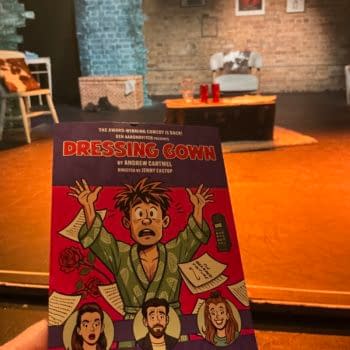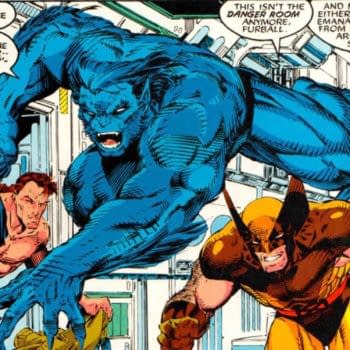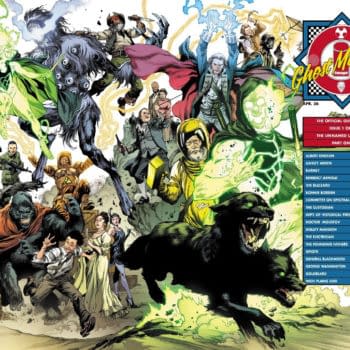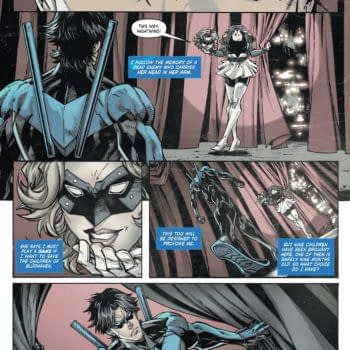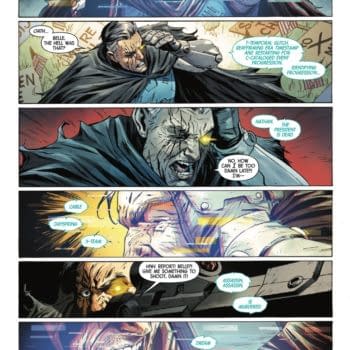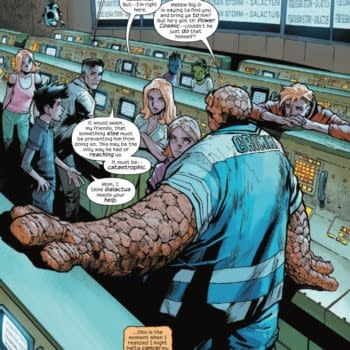Posted in: Comics | Tagged: comicspro, Jenn Haines
We Have Survived Keynote Speech- ComicsPRO President Jenn Haines
Jenn Haines, President of the Board of ComicsPRO, and owner of The Dragon comics shop chain in Ontario, and listed on the new Bleeding Cool Power List still held up by editorial, gave the Keynote Speech to the recent online ComicsPRO 2022 retailer summit. Bleeding Cool is happy to publish her text, in full;

My parents are both immigrants. My dad from small town England, near Liverpool and my mum from Jamaica, growing up in the exceptionally named town of Wait-a-Bit. My dad moved to Canada to take a job as a patent agent, and at the age of 81, is going to retire for the second time any day now… he swears.
His mother started her own business doing at-home makeovers in the 40s, and started a dramatic society to raise funds for blankets for soldiers at the front. My grandfather was a navigator, responsible for training most of the British navigators in WWII with legendary nigh-impossible standards. HIS father had the most successful silent film theatre in the area, as it boasted a live orchestra.
My mum's father was a school principal, a justice of the peace, a funeral officiant, and secretary of the Jamaican Agricultural Society for his parish among many other things, and her mother ran the mother's union group and was the church organist, while raising 8 kids. My mum herself worked as a volunteer for the hospital and suicide hotline. She ferried my sister and I to an exhausting number of extracurriculars and sewed countless costumes for school plays and dance recitals.
This is the legacy that informs me: entrepreneurs, innovators, multi-taskers, risk-takers, volunteers, and theatre people. In a nutshell, we are people who somehow fit 28 hours of work into each day, and we are people who don't ever give up.
It was on a trip to England to visit family that I first discovered comics through my cousins, namely Beano, Rupert, and Asterix. Back home, I knew no one who read comics. I didn't even read one myself until I was 18. It was Batman Adventures 7. I started working at a comic shop two years later, and 3 years after that, I opened my own store, much to my parents' chagrin, as they had no doubt hoped I would choose something more lucrative and easier to explain to their peers.
The Dragon opened on September 15th, 1998 in a 2500 square foot space selling comics, games, toys, and manga, and renting anime. I was 23 years old and had just graduated from university with a Bachelor degree in Classics. My entire knowledge of running a business came from two years working in a comic shop and from participating in 5 years of the Junior Achievement program, which mentors teens through all the steps of creating a working business. Everything about running the shop was figuring it out as I went along and making lots of mistakes in the process.
It took me one month to realize that I couldn't do it all myself. It's not like business was booming, but I was open 7 days a week. It started to take a real toll on me, physically and mentally. So, I took my first big risk (after the sheer act of opening); I hired my first employee. Sadly, worst fears were realized, when I discovered either he or his friends were stealing from me. But I didn't let that stop me from hiring someone new. A lot of times, when things go wrong, the easiest thing seems to be to take back sole control, to do everything yourself. But I knew the business needed me to have focus and energy, and that wasn't going to happen if I was in the store 60 hours a week.
So, I used what I learned from my first hiring to improve my second by figuring out what I really wanted in an employee and tailoring my process, questions, and training to fit that. In fact, I change a little something every time I hire. I've now developed a pretty consistent system, but there are always ways to make incremental improvements.
And this is the crux of how we operate at The Dragon and how I do my work in the industry. We follow the principle of Kaizen, a Japanese business philosophy that strives for continual improvement in efficiency through incremental change. Change is actually a really good thing. We look at change as a strength and let the possibility of that change flow through everything. We are always looking at new ways to make things easier and more efficient. Not every change is successful, but even failure is better than stagnation.
Part of Kaizen is looking within when something goes wrong. When my staff do something incorrectly, the question is not "what's wrong with them", it's "is this clear in the manual" and "were they adequately trained on that"? And everything I ask staff to do comes with a rationale. In Kaizen, everyone on the team contributes to the continuous improvement, and that's only made possible by understanding why we are making changes.
When a customer knocks something off the shelf or damages a fixture, it's not "why can't they be more careful", it's "obviously that display doesn't work. How do we change it to make sure it does?"As a result, we have a section in the staff manual that explains, with pictures, how to organize shelves, including the rationale for each choice.
The bottom line is finding ways to constantly adjust and improve. Even the smallest change has results, and the compounding of those changes can lead to significant growth.
That first year was brutal, no question. I had days with no customers at all. In my first February, I did just enough sales to pay my rent, but not staff or stock. I was constantly facing the possibility that the whole thing would fail, and that wasn't something I was remotely ready for. I faced deep depression that almost overwhelmed me for months. I had to learn to focus on only what I could do today and not all the bills piling up around me or all the things that needed fixing or improving. I had to figure out what to manage in the moment, even if it was only a series of small things, because as I've said, those small things can add up to big change.
I survived.
I begged out of my lease and moved that fall into an 800 square foot spot with a basement that was far more financially viable. In 2000, my competition closed without warning and suddenly we weren't just surviving, we were thriving! Business more than doubled that year, which, by the way, is when the government comes knocking for an audit.
We started making adjustments to stock and events to meet the demands of so many new customers, including beginning to expand our graphic novels from the very small single shelf they had occupied.
We hosted a few signings, but they were unmitigated failures. I once hosted a signing with Chip Zdarsky, Cameron Stewart, J. Torres, and Stuart Immonen, and only a handful of people showed up, one of whom, bizarrely, was Svetlana Chmakova, when she was still self-publishing. It was awkward and embarrassing. But, again I didn't let the failure stop me. Those signings were not my last.
In 2000, I learned that the shop could operate without me, when I went overseas for a week. It was a huge leap of faith, especially in a time that was essentially pre-cellphone. When I got back, I fired two staff and promoted another, who is still with me 22 years later. It wasn't smooth sailing, but the store didn't collapse and it didn't close.
In the fall of 2001, I took another huge risk and moved over an hour away to Toronto, where I spent the next 10 years, completing a Masters and Bachelor of Education, and then teaching. I couldn't have done that if I didn't have staff who were invested in the concept of the business and who were able to provide consistent customer service.
There are two ways I achieved this. First I made sure to communicate my vision of the store to everyone and have them understand why that's the vision. Our staff manual starts with a history of the store because it's important for everyone to understand where we came from and how we got where we are today. It also has an explanation of our mission statement and how we achieve that mission in every aspect of the job.
Second, I have a comprehensive staff manual. It's very important that policies and procedures are consistent and communicated. This consistency helps staff feel confident in doing their jobs and helps the customers feel at ease in their shopping experience. Putting together a staff manual that details all your expectations and procedures is a HUGE task. But you can't shy away from hard work and necessary change, as the rewards are huge.
Over the next several years, the business continued to run steadily with minimal growth. Everything was working just fine.
But, in 2009 when I faced a 20% rent increase, it was time for a new space. I found a comparably priced 2000 square foot unit in the nearby boutique mall that prompted us to make a whole lot of change, growing certain product lines and removing others.
This is the space in which we created our first dedicated kids section. It took over a year for that section to actually start turning a profit. This is one of the things about running a business. You have to have the faith that your decisions are the right ones, but the flexibility to change them if they turn out not to be. That decision definitely turned out to be the right one, but it took patience and determination to get there.
Two years later, in the summer of 2011, I moved back to Guelph permanently. It was time to simplify my life, as I was pregnant at the time. And I needed to be more hands-on to really grow the business. Almost immediately, things shifted again, as we were forced to move to a new unit within the terms of the lease. I was really upset about the move. I didn't love the space; it was smaller and a strange shape, and the stock room was upstairs. It felt like a step back.
I totally love that space now, because the wide and shallow shape with tons of windows made customers more comfortable and careful layout contributed to growing the business. Plus, we got hardwood for the first time, which is so much better than carpet! Honestly, every time I've moved or expanded, it's been an opportunity to ask, what could I try this time that I've always wanted? How can I solve problems x, y, and z?
In the fall of 2016, I decided to open a second location in the south end of Guelph in a 2000 square foot space, hoping to capitalize on this rapidly growing area. Opening that second location was a big risk, and it has not worked out. After a little over a year, that lease was more a millstone than anything, and I had to move into a 1500 square foot unit in the same plaza adding a year to my lease and a pretty substantial lease-break penalty and again feeling like I was taking a step back. I'm now counting down the days until I get to close that location. In the end, all it did was split my customer base and double my overhead. Yikes.
But I survived.
In June 2018, I opened a third location about half an hour out of town. This was another risk. I knew it meant that I would be hiring a pretty autonomous manager and that takes a lot of trust. Through staff manuals and consistency that location has done nothing but grow and is now outpacing my south-end store, with half the overhead.
Three stores is a heck of a juggling act, on top of 2 kids, ComicsPRO, and finding time for myself. But I just kept pivoting and adjusting and fighting my way through it.
And then COVID hit. What. The. Hell.
Striving for incremental change went out the window. Energy and focus and stable mental health went out the window. I worried about my staff, about my family, and worked myself to a state in which I most definitely had to worry about myself. For the first time, I believed my store would not survive, and that fear was the most brutal thing I have ever experienced. It meant letting down my family and my customers and myself.
I think the biggest challenge we face every day is fear. We fear the unpredictability of daily sales, customers abandoning their pulls, price increases, late or damaged shipments, whether we're ordering too much or too little, what our staff are doing when we're not there, and the rare but agonizing negative reviews. Every decision we make carries the fear of failure with it. And we fear change. Oh boy, do we fear change.
But, let's face it, we've been in a state of near constant change since March of 2020.
In life, every change or new situation brings with it a certain level of stress. It could be something small, like ordering food you've never had before or going into a new store, or it could be something big like starting a new project or moving to a new place. Generally, we can handle two to three of these changes a day.
But COVID made it so that every single thing we did brought change, from wearing masks, to how we shopped for groceries, to not being able to see friends and family, to not being able to do what we were used to doing. We cancelled plans and vacations. We weren't able to visit people in the hospital, or have weddings or funerals. We built home gyms and baked bread to try to maintain momentum.
And amidst all of that change, we also had to face the absolute fear that the businesses we had built and fought for might not survive, not by anything we did, but by things utterly out of our control. We experienced extra stressful change like not having new comics for two months, then new distribution and new ordering processes, and no events or conventions to see each other, and the constant flux of government restrictions and supports, and just trying to keep everything straight.
It is no wonder that we've all become a little harder, a little angrier, a little more fearful.
But the thing about fear is that it is a choice. You can allow it to make your decisions for you. You could never take a day off because you don't trust anyone to run the store as well as you. You could avoid a new project because it might fail. You could be so stressed about how to do something as simple as ordering comics in this new landscape that you take it out on everyone around you. And we tend to take that fear out as anger – on customers, products, distributors, publishers, friends, family, on peers.
Or, you could find a way to subvert that fear, channeling that energy in different ways. We have all shown amazing resilience throughout this. Every single one of us has made it through almost 24 months of COVID life and retail. We have pivoted with lockdowns. We have started livestreams and shopping channels and online stores and delivery services. We have found new ways to stay open even without product and sometimes even without being able to be open. This is truly amazing.
We have survived.
Let's face it, right now the industry is in a real state of flux. Change is happening. It's rapid and it's awkward and it's not fun. And it's going to continue. But, we are resilient. While we definitely all wish sometimes that we could go back to simpler times, the fact is that we can't, and so we can choose to be stressed and frustrated, or we can pivot and adapt and find new paths forward. We've proven how good we are at pivoting during the pandemic. We've just got to keep going.
This industry is incredible, truly. It's a collection of passionate, driven, smart people. We are a community who can lean on each other and share our knowledge and grow together into something new and wonderful. And yeah, it's going to look nothing like it did 5 or 10 years ago, but does anything? We still get to do what we love: selling comics.
We're all in this industry because we are in love with this medium. Every single person working in comics whether it's retail or publishing or distribution CARES about comics in deeply personal ways that they may never share, but… you know, because we're all the same. Really. Deep down.
That can be hard to remember, when we're just trying to survive. Like I said, we've all gotten a little harder, a little angrier, a little more fearful.
But, here's the other really important thing I want to leave you with today: We are all going through this thing together. My COVID experience may not look the same as the COVID experience of my hairdresser, or my kids' teacher, or the person bagging my groceries. It doesn't look the same as your experience. We are all currently going through our own singular trauma.
For every person I deal with, I like to take a moment and remember this. Maybe they need just a little kindness, and they almost certainly don't need me to be negative or place blame on them, because we're all dealing with SO much negativity already.
There is a level of kindness that we have lost and it's dragging us down. There is a tinge of desperation in our dealings, an attempt to cling to what once was instead of trying to figure out how to manage what currently IS.
COVID was a massive disruptor. It caused everyone to look at how they are doing business and living life. It caused us to make changes to improve our situations. We need to recognize that that's also what our industry partners have done. Just as you have made conscious, thoughtful, necessary decisions in your business, so have they.
So, we have to decide how we want to move forward. Is it through anger at the change? Or is it pivoting and taking risks, following the path of kaizen and finding ways to embrace these changes as opportunities? I know which path I'm taking, because it's the one I've always walked, through every hire, every new location, every product-line change, every store display. All of you have taken your own countless risks too and are capable of taking more.
As I've been talking, I suspect you've found a reflection of yourself and your business somewhere in my words. We are all risk-takers, we are all tenacious to a fault, we are all ready and able to pivot when things go wrong. We are also all exhausted, because these COVID times are no joke. The fact is, I feel like I have been at my most unproductive in the last 2 years. I feel like nothing is organized the way I want. It takes far more work to find the energy to get going on a project than it ever used to. I am burnt out. And so is every single person I work with or talk to.
So, a little kindness, a little risk-taking, a little pivoting. Incremental improvements for greater efficiency. All we can do is keep moving forward and adapting. We all know we can, as that's basically all we've been doing for the last two years, in spite of everything. And learn, learn from your peers, learn from your failures.
Kaizen and kindness. That's it.
Jenn Haines is owner of The Dragon, a three-store chain of comic stores, and Vice President of the ComicsPRO retailer advocacy group. ComicsPRO ComicsPRO ComicsPRO ComicsPRO ComicsPRO ComicsPRO ComicsPRO ComicsPRO ComicsPRO ComicsPRO ComicsPRO ComicsPRO ComicsPRO ComicsPRO ComicsPRO ComicsPRO ComicsPRO ComicsPRO ComicsPRO ComicsPRO ComicsPRO ComicsPRO ComicsPRO







